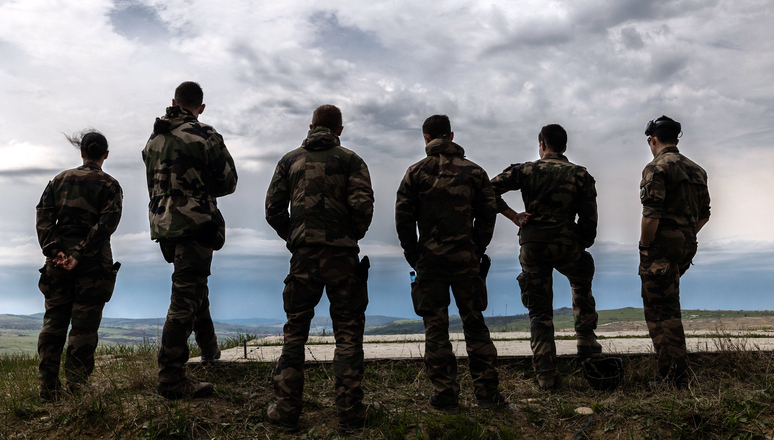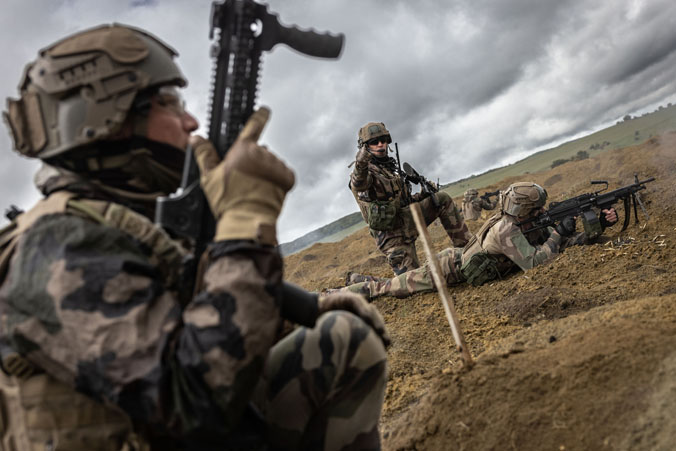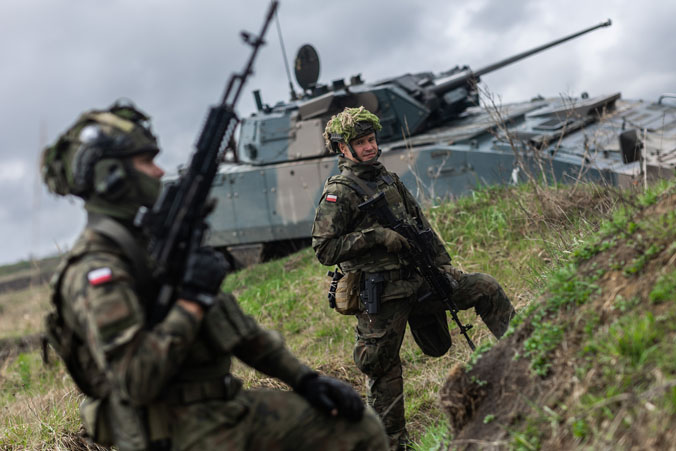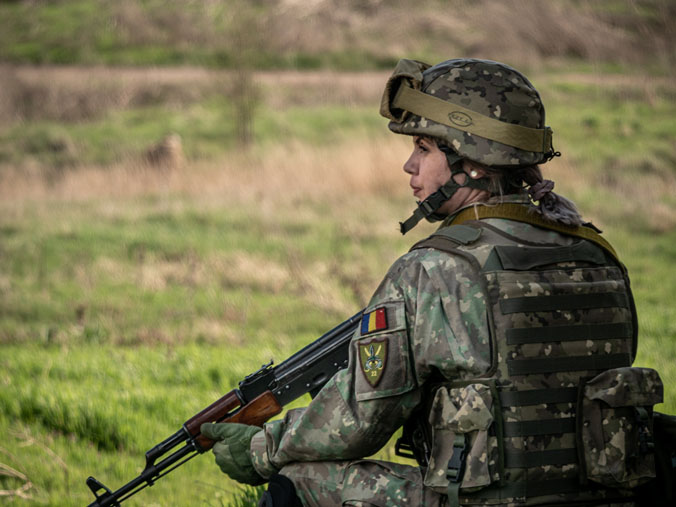Earlier this year, Allies agreed to enhance NATO's presence in the east of the Alliance by establishing four new multinational battlegroups in Bulgaria, Hungary, Romania and Slovakia (in addition to the existing battlegroups in Estonia, Latvia, Lithuania and Poland, which have been in place since 2017). Now, Allied troops are training together in these new battlegroups, demonstrating their ability and commitment to working together - come rain or come shine.

French soldiers observe a live-fire exercise at the new NATO multinational battlegroup in Romania, where they are working alongside their Polish and Romanian counterparts.
For a soldier, rain is a fact of life.
It streams from the brim of your Kevlar helmet. It plasters your cold, wet combat uniform to your skin. And it turns the Romanian soil of Cincu Training Area into cake-batter mud that gloms onto your boots and adds a kilogram to every step.
But for these French soldiers assembled for a live-fire exercise, the rain seemed like an afterthought. They stood outside their armoured personnel carriers, which were parked in a line beside Polish and Romanian infantry fighting vehicles, waiting for the order to move out. Perhaps they'd simply grown used to the weather after several months of being deployed to Romania as part of the NATO Response Force.
The call came down the line: "Allons-y." Let's go. The French, Polish and Romanian soldiers grabbed their rifles and ducked into the cramped confines of their vehicles for the short ride to the gunnery range.

French soldiers get into position under cloudy grey skies during a live-fire exercise in Cincu, Romania.
The French Army - which in 2022 is serving as the lead nation of the highest-readiness element of the NATO Response Force - deployed troops to Romania following Russia's invasion of Ukraine on 24 February, alongside a contingent of Belgian soldiers. In May, the French and Belgians formally stood up NATO's first multinational battlegroup in Romania, with a contingent of Dutch soldiers due to arrive in the coming months.
The battlegroup is backed up by rotational deployments of US and Polish mechanised infantry elements - including troops from the US Army's 2nd Cavalry Regiment, forward deployed from Vilseck, Germany, and the Polish Army's 17th Mechanised Brigade. While not under direct NATO command, these units greatly enhance the Alliance's defensive posture while giving their troops invaluable time to cross-train with their Allies.

Polish soldiers hold positions following a live-fire exercise in Cincu, Romania.
As the French, Polish and Romanian armoured vehicles raced towards the firing line underneath dark, woolly clouds, it was hard to shake the sense that this felt different from your standard exercise - the gloomy sky matched the mood of the continent, where Russia's war against Ukraine has shattered peace and created the biggest security crisis in Europe since the Second World War.
The vehicles came to a halt and opened fire at simulated targets downrange, the .50-calibre machine gun mounted on the French armoured personnel carrier chattering against the deeper chug-chug-chug of the 30-millimeter autocannons mounted on the Polish and Romanian vehicles. After laying down a blanket of suppressing fire, the hatches opened and the soldiers spilled out, sprinting towards their firing positions.
For a few minutes, every rifle on the firing line was sending rounds downrange, soldiers pausing only to change magazines. Combined with sustained cannon fire from the infantry fighting vehicles, the volume of firepower was deafening. When it was over, the only sound was the voices of French, Polish and Romanian platoon leaders confirming over the radios that they'd spent all their ammunition. The soldiers mounted up and headed back to camp on the groan of diesel engines.

A soldier with the French Army's 93rd Mountain Artillery Regiment crawls under a barbed wire obstacle in Cincu, Romania. Troops go through a wide variety of physical tests and training in NATO multinational battlegroups, in addition to live-fire exercises.
Along with the other new battlegroups in Bulgaria, Hungary and Slovakia, NATO's multinational battlegroup in Romania is a tangible manifestation of how European security has changed since February. While Allied soldiers routinely deployed to Romania in the past for training exercises, their permanent presence comes with a palpable sense of gravity.
"In the first week of the deployment, we felt that it was a very important historical moment," said Lieutenant Colonel Adrien, deputy commander of the battlegroup. He had deployed with the first French forces activated as part of the NATO Response Force.
"We also felt the responsibility that we had as leaders of this spearhead battalion," he explained, "the responsibility that we have to demonstrate our capabilities to be ready, totally, with our Allies to fulfil the mission that we have been given."
NATO troops from across the Alliance have continued to arrive at all four new battlegroups over the past several months, as they carry out the process of being set up and integrated into NATO's military command structure. No matter where they're from or where they're deployed, these soldiers will stand side-by-side with their Allies and live, work and train in the toughest conditions - whether there are blue skies or grey skies ahead.

A Romanian soldier trains alongside her NATO Allies at the new multinational battlegroup in Romania.
This article is part of a series of dispatches from the field, showing what life is like on the ground for NATO and partner armed forces. Check out the other articles for more stories of troops exploring new countries, enduring the elements and cooperating with friends.






